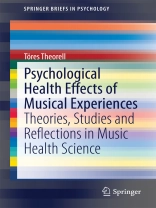This book is about links between music and health. It focuses on music and public health, and, in particular, the potentially positive and negative effects of listening to and making music on the health of the general population. The book starts out by discussing the protection music offers against adverse effects of stress. It then discusses social aspects of music production and listening and examines religious music within the framework of social functioning. It offers insight into the physiological and psychological effects of music listening, the biological effects of singing, and the use of music in therapeutic situations and the rearing of children. The book concludes by discussing the significance of music for musicians and their health. Although it may seem that music has only good health effects, and therefore all professional musicians should be healthy, not all music effects are positive. The book describes situations in which music has negative health effects and makesclear that there is a pronounced difference between living with music for joy and to earn one´s living from making music. In the latter situation, performance anxiety may become a factor that affects health adversely.
สารบัญ
Chapter 1: Introduction.- Chapter 2: Stress and Music.- Chapter 3: Music in Social Cohesion.- Chapter 4: Music in Religion.- Chapter 5: Physiological Aspects of Listening to Music.- Chapter 6: Music in Treatment.- Chapter 7: What Happens in the Body during Singing?.- Chapter 8: Singing Together.- Chapter 9: Growing up with Music.- Chapter 10: The Musician´s Health.- Chapter 11: Final Thoughts.
เกี่ยวกับผู้แต่ง
Tores Theorell is a physician who was serving in internal medicine in the years 1967-1978. From 1979 he has been a researcher in stress medicine and social medicine. Between 1995 and 2006 he served as director of the Swedish National Institute for Psychosocial Factors and Health and was also a professor at the Karolinska Institute during this period. As a retired professor he presently serves as scientific consultant for the Institute for Stress Research at the Stockholm University and is active at the department of Neuro Science at the Karolinska Institute. Theorell´s research has had diversity from epidemiology to clinical observational studies and controlled interventions. Since the mid 1980:s he has also published in the area of Cultural Participation and Health. Theorell has been first author or co-author of more than 400 original publications in international peer reviewed scientific journals. He has also contributed chapters to numerous handbooks and textbooks in English. Hehas for instance contributed to the Oxford University Press Handbook of Culture and Health (eds Clift, Camic, Wilson, in press 2014). His most widely quoted publication was with Robert Karasek (Karasek and Theorell: Healthy Work, Basic Books, New York, 1990). Physiological stress mechanisms relating to cardiovascular disease has been one of Theorell´s most prominent areas.











